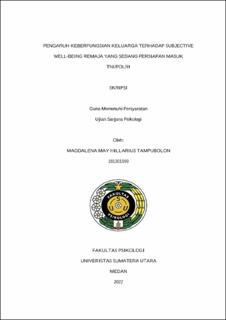| dc.contributor.advisor | Nasution, Indri Kemala | |
| dc.contributor.author | Tampubolon, Magdalena May Hillarius | |
| dc.date.accessioned | 2022-11-10T04:48:55Z | |
| dc.date.available | 2022-11-10T04:48:55Z | |
| dc.date.issued | 2022 | |
| dc.identifier.uri | https://repositori.usu.ac.id/handle/123456789/57159 | |
| dc.description.abstract | This study aims to examine the effect of family functioning on the subjective well-being of adolescents who are preparing to enter the TNI/Polri. This study used research subjects as many as 156 people. The method used in this study is a quantitative method with data collection using a Likert scale, namely the Family Assessment Device scale which was compiled based on aspects by Epstein et al., (2005) consisting of 60 items and a subjective well-being scale with 2 scales namely SWLS and SPANE which has been adapted by Ahtar (2019) based on the aspects proposed by Ed Dinner (2009) which consists of SWLS 5 items and SPANE 12 items. Analysis of the data used is a simple linear regression method. The results of this study indicate that there is no effect of family functioning on the subjective well-being of adolescents who are preparing to enter the TNI/Polri. Family functioning contributes 0,20% in influencing the subjective well-being of adolescents. | en_US |
| dc.language.iso | id | en_US |
| dc.publisher | Universitas Sumatera Utara | en_US |
| dc.subject | Family Functioning | en_US |
| dc.subject | Subjective Well-Being | en_US |
| dc.subject | Adolescents | en_US |
| dc.title | Pengaruh Keberfungsian Keluarga terhadap Subjective Well-Being Remaja yang sedang Persiapan Masuk Tni/Polri | en_US |
| dc.type | Thesis | en_US |
| dc.identifier.nim | NIM181301099 | |
| dc.identifier.nidn | NIDN0019038301 | |
| dc.identifier.kodeprodi | KODEPRODI73201#Psikologi | |
| dc.description.pages | 82 Halaman | en_US |
| dc.description.type | Skripsi Sarjana | en_US |

